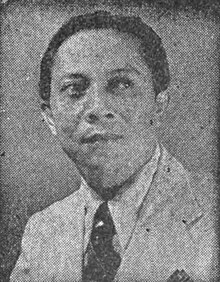Sutan Sjahrir | |
|---|---|
 Portrait of Sjahrir, 1950 | |
| 1st Prime Minister of Indonesia | |
| In office 14 November 1945 – 3 July 1947 | |
| President | Sukarno |
| Preceded by | Office established |
| Succeeded by | Amir Sjarifuddin |
| 2nd Minister of Home Affairs | |
| In office 14 November 1945 – 12 March 1946 | |
| President | Sukarno |
| Preceded by | Wiranatakusumah V |
| Succeeded by | Sudarsono |
| 2nd Minister of Foreign Affairs | |
| In office 14 November 1945 – 3 July 1947 | |
| President | Sukarno |
| Preceded by | Achmad Soebardjo |
| Succeeded by | Agus Salim |
| Personal details | |
| Born | 5 March 1909 Padang Pandjang, Sumatra's West Coast, Dutch East Indies |
| Died | 9 April 1966 (aged 57) Zürich, Switzerland |
| Resting place | Kalibata Heroes' Cemetery |
| Political party | PSI |
| Spouses |
|
| Relatives | Soedjatmoko (brother-in-law) |
| Alma mater | |
| Occupation |
|
| Signature |  |
Sutan Sjahrir[a] (5 March 1909 – 9 April 1966) was an Indonesian politician and revolutionary independence leader who served as the first Prime Minister of Indonesia from 1945 until 1947. Previously, he was a key Indonesian nationalist organizer in the 1930s and 1940s. Unlike some of his colleagues, he did not support the Japanese during the Japanese occupation and fought in the resistance against them. He was considered to be an idealist and an intellectual.[1]
Born to a Minangkabau family, he studied at the University of Amsterdam and later became a law student at Leiden University. He became involved in Socialist politics, and Indonesia's struggle for independence, becoming a close associate of the older independence activist Mohammad Hatta, who would later become the first Vice President of Indonesia. During the Japanese occupation of the Dutch East Indies, Sjahrir fought in the resistance. Towards independence on 17 August 1945, he was involved in the Rengasdengklok Incident and the Proclamation of Independence. Following the release of his 1945 pamphlet "Our Struggle" ("Perjuangan Kita"), he was appointed Prime Minister of Indonesia by President Sukarno. As prime minister, he was one of the few Republican leaders acceptable to the Dutch government, due to his non-cooperative stance during the Japanese occupation. He also played a crucial role in negotiating the Linggadjati Agreement.
Sjahrir founded the Indonesian Socialist Party (PSI) in 1948 to politically oppose the Indonesian Communist Party (PKI). Although small, his party was very influential in the early post-independence years. However, Sjahrir's socialist party ultimately failed to win support and was later banned in 1960, after the party was suspected of being involved in the Revolutionary Government of the Republic of Indonesia rebellion. Sjahrir himself would eventually be arrested and imprisoned without trial in 1962. In 1965, he was released to seek medical treatment and was allowed to go to Zürich, Switzerland. There, he died on 9 April 1966. On the same day, through Presidential Decree No. 76/1966, Sjahrir was inaugurated as a National Hero of Indonesia.[1]
Cite error: There are <ref group=lower-alpha> tags or {{efn}} templates on this page, but the references will not show without a {{reflist|group=lower-alpha}} template or {{notelist}} template (see the help page).
- ^ a b Dotulong 2010.